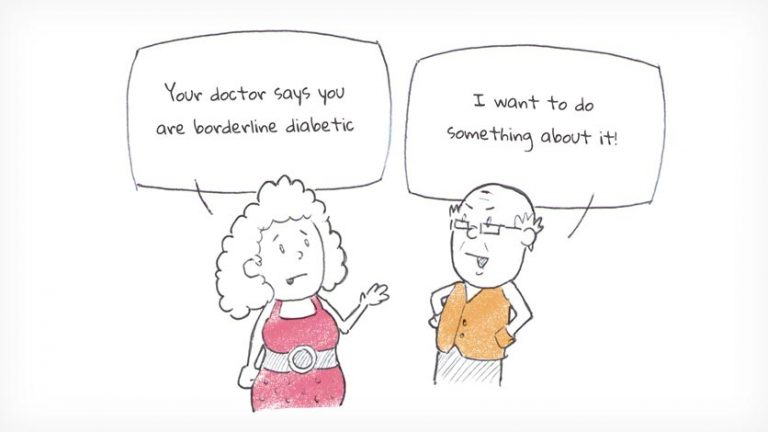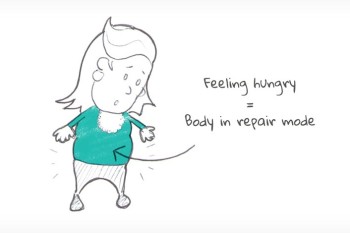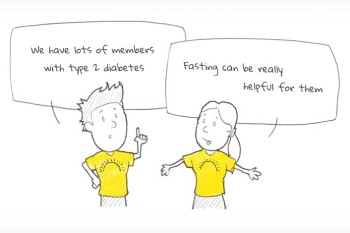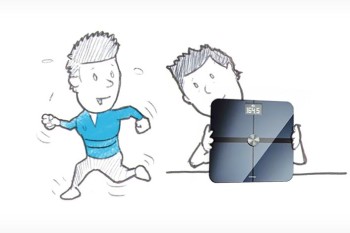Type 2 diabetes (the kind that develops in later life) is one of the fastest increasing diseases in the developed world. Currently about 1 in 10 people in these countries has type 2 diabetes,1 but by 2050 it has been estimated that the rate could rocket to 1 in 3 people. Diabetes is a big killer too, with the risk of heart attack and stroke being multiplied 3-fold by having diabetes.
The biggest risk factor for developing diabetes is obesity, so even if all intermittent fasting did was to help you lose weight, it would reduce your risk of developing diabetes. In fact, intermittent fasting does more than simply help you to lose weight.
Fasting has been shown to improve the way our bodies control blood sugar levels by its effects on insulin production.1
Learn more about how our bodies handle carbohydrates, proteins and fats in the diet
Learn more about what happens when we fast
How does type 2 diabetes develop?
Insulin resistance is the driving force behind development of type 2 diabetes. When we eat carbohydrate-containing foods, our digestive system converts the carbohydrate to the sugar, glucose, which is absorbed into the bloodstream. Although our bodies can use glucose to supply energy, it is toxic at high levels and so it is important that our bodies keep our blood glucose concentrations within safe limits. It does this by releasing the hormone, insulin. Insulin’s job is to move the glucose out of the blood and into the liver, muscles and fat stores where it is converted into glycogen (the stored form of glucose) and fat. When we are young, it does this very efficiently, but as we age our bodies can become resistant to the effects of insulin and so blood glucose levels stay too high for too long. Our bodies respond by increasing the amount of insulin they produce. The cells that respond to insulin become even more resistant and a vicious cycle is created of worsening insulin resistance, higher blood sugar levels and correspondingly higher insulin levels. All this goes on without us being aware of it. Eventually, after many years, however, the body cannot produce enough insulin to overcome the insulin resistance and signs and symptoms of diabetes (being very thirsty, needing to pass urine frequently, feeling very tired) first appear. However, even before the symptoms appear, the slightly higher than normal blood sugar levels will have been damaging body tissues, including:
-
Damaging the lining of the arteries and increasing risks of heart disease and stroke
-
Damaging the kidneys
-
Damaging the eyes
-
Damaging the nervous system.
Why some people are more prone to insulin resistance than others is not known. There is a very strong link between being overweight or obese and insulin resistance. The risk is particularly high if you carry your weight around your middle. Having a waist measurement larger than half of your height is an indicator of increased risk of diabetes. If you have a big belly, therefore, there is a good chance that you have already taken the first steps along the path to diabetes. Luckily, you now have to tools to turn away from this path by using intermittent fasting to control your weight and to improve the way your body handles carbohydrates.
What is the standard treatment for type 2 diabetes?
When the first signs of type 2 diabetes develop, it is possible to improve and reverse things through losing weight and exercise. Both can reverse insulin resistance, but most people find it hard to make enough of these lifestyle changes to prevent insulin resistance from worsening. And the typical pattern of type 2 diabetes is that insulin resistance continues to worsen.
If lifestyle changes fail, doctors can use different drugs to help the body keep blood sugar within safe limits. These generally aim either to reduce insulin resistance (e.g., metformin) or to boost insulin production (e.g., gliclazide, glimepiride, and glipizide.).
Eventually insulin injections will probably be the only way to keep blood sugar to safe levels.
To learn more about type 2 diabetes and its treatment, a good website to visit is: www.diabetes.co.uk
How can intermittent fasting help diabetes?
Intermittent fasting can reverse the progress of diabetes. When we fast, we are not eating any carbohydrate (or anything at all!) and this means the body does not need to make insulin to control blood sugar. As insulin levels fall, the tissues that were resisting its action are no longer washed in high amounts of insulin. When we eat carbohydrates again, the tissues are more sensitive to the effects of insulin. Insulin-resistance has taken a small step backwards.
An improvement in glucose metabolism is has been seen in studies of intermittent fasting:
-
People who fasted for 24 hours once a month were less likely to have been diagnosed with diabetes in a study of 200 people in Utah. Those who fasted also had slightly lower blood glucose values.2
-
Young men who fasted for 20 hours every other day for 2 weeks (but kept their calorie intake the same as before they started fasting) showed improved insulin sensitivity even though they did not lose any weight.3
-
Women with type 2 diabetes who fasted for 3 days showed lower blood glucose and enhanced insulin sensitivity.4
-
People with type 2 diabetes who fasted for 18 hours showed a 23% fall in blood glucose concentrations between 12 and 18 hours of fasting.5
-
Men with type 2 diabetes who fasted for 24 hours showed a fall in blood glucose and insulin levels.6
-
Overweight women who semi-fasted for two days per week (600 kcal allowance) showed a reduction in insulin resistance that was significantly greater than that seen by a simple daily calorie restricted diet.7
Curiously, one study of alternate day fasting in a group of normal weight men and women who fasted for 36 hours on an alternate day schedule found that after three weeks, the women showed a slightly worsened glucose response to a meal, whereas the men did not.8 This study involved a great deal of fasting and shows that it is possible to fast too much. Currently, at FastDay we do not recommend fasting for 36 hours with no calories any more often than twice a week.
Learn more about fasting with diabetes
Real life experiences
There are many people in our FastDay community who have used intermittent fasting to help control their diabetes and found that they could not only improve their blood glucose results but also reduced their need for medications.















